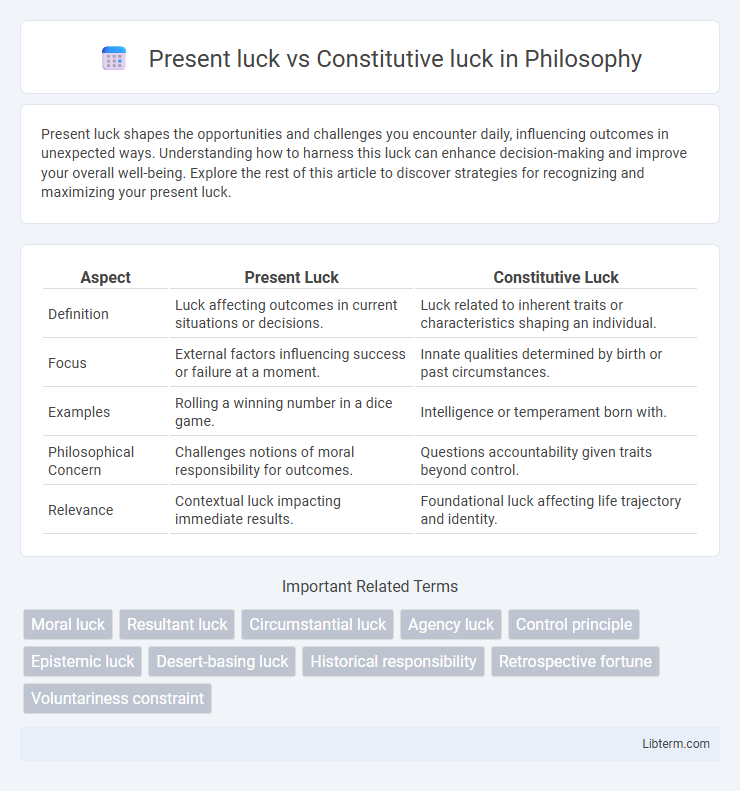Present luck shapes the opportunities and challenges you encounter daily, influencing outcomes in unexpected ways. Understanding how to harness this luck can enhance decision-making and improve your overall well-being. Explore the rest of this article to discover strategies for recognizing and maximizing your present luck.
Table of Comparison
| Aspect | Present Luck | Constitutive Luck |
|---|---|---|
| Definition | Luck affecting outcomes in current situations or decisions. | Luck related to inherent traits or characteristics shaping an individual. |
| Focus | External factors influencing success or failure at a moment. | Innate qualities determined by birth or past circumstances. |
| Examples | Rolling a winning number in a dice game. | Intelligence or temperament born with. |
| Philosophical Concern | Challenges notions of moral responsibility for outcomes. | Questions accountability given traits beyond control. |
| Relevance | Contextual luck impacting immediate results. | Foundational luck affecting life trajectory and identity. |
Understanding Present Luck and Constitutive Luck
Present luck refers to the unpredictable factors affecting an individual's current situation, such as sudden opportunities or misfortunes beyond their control. Constitutive luck involves the innate traits, dispositions, or circumstances one is born with, shaping personality, abilities, and life path. Understanding present luck helps analyze immediate external influences, while constitutive luck highlights foundational elements influencing long-term outcomes.
Key Differences Between Present and Constitutive Luck
Present luck refers to the accidental factors influencing outcomes at the moment of an event, while constitutive luck involves the unchosen traits and circumstances that shape an individual's character and predispositions over time. Key differences include temporal scope--present luck is immediate and situational, whereas constitutive luck is historical and formative--and the nature of influence, with present luck affecting decisions and results directly, and constitutive luck underlying the capacities and tendencies that inform those decisions. Understanding these distinctions clarifies how randomness impacts moral responsibility differently through transient events versus ingrained personal attributes.
The Role of Luck in Shaping Human Life
Present luck influences immediate outcomes by chance events occurring at the moment, while constitutive luck shapes an individual's fundamental traits and circumstances beyond their control. Both forms of luck play crucial roles in determining life trajectories, affecting opportunities, social status, and personal capabilities. Understanding the interplay between present and constitutive luck reveals how fortune impacts human agency and ethical considerations in society.
Present Luck: Definition and Key Examples
Present luck refers to the favorable or unfavorable outcomes occurring due to factors beyond an individual's control at the exact moment of action. Key examples include winning a lottery draw or being caught in an unforeseen storm while commuting. These instances highlight how immediate circumstances influence success or failure despite one's intentions or efforts.
Constitutive Luck: Definition and Key Examples
Constitutive luck refers to the elements of a person's nature or identity that are determined by factors beyond their control, such as genetics, upbringing, or inherent personality traits. Examples include having a naturally optimistic disposition that influences life outcomes or being born into a family with particular cultural values that shape opportunities and beliefs. This form of luck contrasts with present luck, which pertains to random events affecting an individual at a specific moment, highlighting how constitutive luck underpins the foundational aspects of personal identity and experience.
Philosophical Perspectives on Luck
Philosophical perspectives on luck distinguish present luck, which concerns the immediate, contingent factors influencing outcomes, from constitutive luck, involving traits and dispositions shaped by circumstances beyond an individual's control. Present luck affects events directly, such as chance encounters or random hazards, whereas constitutive luck pertains to the foundational aspects of one's character and situation that predispose actions. This distinction is crucial in debates about moral responsibility, highlighting how luck undermines or supports accountability depending on its form.
The Debate: Moral Responsibility and Luck
The debate on moral responsibility and luck contrasts present luck, involving uncontrollable outcomes of actions, with constitutive luck, which encompasses traits and dispositions formed beyond one's control. Philosophers argue whether individuals can be held fully responsible for actions influenced by constitutive luck, as these inherent characteristics shape decisions and behavior. This discourse fundamentally challenges traditional notions of moral accountability by emphasizing the complex interplay between personal agency and uncontrollable factors.
Implications of Present and Constitutive Luck on Free Will
Present luck refers to the random factors affecting decisions at the moment of action, influencing free will by introducing unpredictability in choices without undermining moral responsibility. Constitutive luck involves the traits and dispositions shaped by circumstances beyond one's control, raising questions about the extent of genuine autonomy if character is significantly predetermined. The interplay between present and constitutive luck challenges traditional notions of free will by highlighting how both chance occurrences and inherited traits can limit true agency.
Real-World Impacts of Luck on Personal Achievement
Present luck shapes immediate opportunities and setbacks, directly influencing outcomes in career advancements and personal achievements. Constitutive luck, involving factors like genetics, upbringing, and social environment, establishes foundational traits and resources that significantly affect long-term success and resilience. Understanding these types of luck reveals how uncontrollable external factors intertwine with effort to determine individual accomplishments in real-world contexts.
Addressing Luck in Ethics and Decision-Making
Present luck, referring to unpredictable factors affecting immediate outcomes, challenges ethical responsibility by complicating assessments of moral accountability in decision-making processes. Constitutive luck involves traits and circumstances beyond one's control, influencing character and choices, thereby raising questions about fairness in judging actions and ethical blame. Addressing both forms of luck requires integrating these concepts into ethical frameworks to more accurately evaluate responsibility and promote just decision-making.
Present luck Infographic

 libterm.com
libterm.com